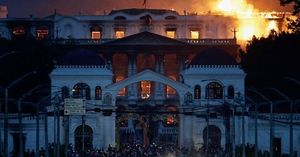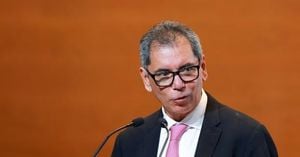Brazil’s political landscape has been thrust into turmoil once again as explosive allegations against former President Jair Bolsonaro and his son Eduardo dominate headlines just weeks before a landmark Supreme Court verdict. Federal police have formally accused the pair of obstruction of justice, unveiling a trove of evidence that paints a portrait of desperation, international intrigue, and political maneuvering at the highest levels. The developments come as Bolsonaro, 70, faces trial for allegedly masterminding an attempted coup after his defeat in the contentious 2022 presidential election.
According to reports from the BBC and the Associated Press, investigators discovered a draft letter on Bolsonaro’s mobile phone suggesting he intended to seek political asylum in Argentina. The 33-page document, dated February 10, 2024, was addressed directly to Argentine President Javier Milei, a far-right leader and close political ally. The timing of the letter is particularly striking: it was saved just days after Bolsonaro’s passport was seized by Brazil’s Supreme Court as part of the ongoing coup investigation, and shortly after police conducted searches of his home and office.
The letter’s contents, as quoted by AP, leave little doubt about Bolsonaro’s intentions: “I, Jair Messias Bolsonaro, request political asylum from Your Excellency in the Republic of Argentina, under an urgent regime, as I find myself in a situation of political persecution in Brazil and fear for my life.” The draft, which police say was last modified in February 2024, has not been officially received by Milei’s government, according to Argentine spokesperson Manuel Adorni. Nonetheless, police argue that its existence demonstrates Bolsonaro’s intent to evade Brazilian justice.
Adding fuel to the fire, police reports also detail how Bolsonaro spent two nights at the Hungarian Embassy in Brasília around the same time, sparking speculation that he was seeking refuge to avoid arrest. While Bolsonaro has repeatedly denied any plans to flee, telling Reuters in July 2025, “I’ve never considered leaving the country, never,” the evidence uncovered by investigators appears to contradict his public statements.
The obstruction of justice allegations do not stop with the former president. Eduardo Bolsonaro, 41, a sitting member of Brazil’s Congress, is accused of orchestrating an international pressure campaign in support of his father. Police allege that Eduardo lobbied the Trump administration, resulting in a dramatic escalation of tensions between Brazil and the United States. In July 2025, former President Donald Trump announced a 50% tariff on Brazilian exports, explicitly citing Brazil’s treatment of Bolsonaro as the reason for the punitive measure. The U.S. State Department also imposed travel bans on eight Brazilian Supreme Court justices, including the trial’s presiding judge, Alexandre de Moraes.
Messages between father and son, reviewed by AP, reveal the extent of Eduardo’s efforts and the pressure he felt. In one exchange, Eduardo warned, “You won’t have time to reverse the situation if the guy here turns his back on you. Everything here is very touchy, every little thing affects you.” He went on to express concerns about shifting political winds in Washington, saying, “Even inside the White House, there are people telling (Trump): ‘OK, Brazil is gone. Let’s move on.’”
Eduardo also boasted of securing U.S. government support “with great difficulty,” claiming that he and an ally, Paulo Figueiredo, were the only ones with access to the White House. In a July 10 message, he reassured his father, “The most powerful man in the world is on your side. We did our part.” Yet, the relationship between father and son was not without friction. Some messages, peppered with expletives, show Eduardo calling his father “ungrateful” for not recognizing his behind-the-scenes efforts. He also urged Bolsonaro to “ACT RESPONSIBLY” so Eduardo would not have to remain much longer in the U.S.
For his part, Eduardo Bolsonaro has denied any wrongdoing. He stated on social media that his actions in the U.S. “never aimed at interfering in any ongoing proceedings in Brazil,” and described the publication of their private conversations as politically motivated. “The conversations with my father that are part of the investigation are absolutely normal,” he insisted, according to AP.
The intricate web of international lobbying also involved Martin de Luca, a lawyer for video platform Rumble and the Trump Media Group. De Luca provided Bolsonaro with updates about a U.S. lawsuit challenging Justice de Moraes, and on July 14, Bolsonaro sent De Luca a voice message seeking advice on a statement praising Trump. “I drafted a note, I think I sent it to you, with four short paragraphs. It is good, praising Trump, saying that freedom is much more important than economic issues,” Bolsonaro said. “I was really happy with Trump, very grateful to him. Please guide me with a short statement from your side, so I can post it on my channels and send it back to you.”
Amid these revelations, the legal noose appears to be tightening. Judge Alexandre de Moraes, overseeing the coup trial, has given Bolsonaro’s lawyers 48 hours from August 21, 2025, to explain the draft asylum request and address alleged violations of his house arrest, including unauthorized communications and spreading content targeting Brazil’s democratic institutions. Bolsonaro is currently under house arrest, barred from social media and from contacting Eduardo due to previous breaches of court restrictions.
The stakes could hardly be higher. Prosecutors allege that Bolsonaro and several allies headed a criminal organization that sought to overturn the 2022 election results, even plotting to kill President Luiz Inácio Lula da Silva and Judge de Moraes. The Supreme Court is expected to deliver its verdict between September 2 and 12, 2025. While the new findings on the Argentina asylum plot may not directly impact the outcome of the coup trial, they add significant weight to the perception that Bolsonaro was willing to go to extraordinary lengths to avoid accountability.
Political reactions have been sharply divided. Bolsonaro continues to maintain his innocence, framing the charges as part of a “political witch hunt” designed to eliminate him from contention in the 2026 presidential race. His supporters, including influential evangelical pastor Silas Malafaia, have echoed these claims, with Malafaia’s passport and cell phone seized by investigators but no formal charges filed. Meanwhile, President Lula’s government has remained largely silent on the latest allegations, perhaps wary of inflaming an already volatile situation.
As the clock ticks down to the Supreme Court’s decision, Brazil finds itself at a crossroads. The unfolding drama has exposed deep rifts within the nation’s political fabric and raised uncomfortable questions about the resilience of its democratic institutions. All eyes are now on Brasília, where the fate of Jair Bolsonaro—and perhaps the future of Brazilian democracy itself—hangs in the balance.



